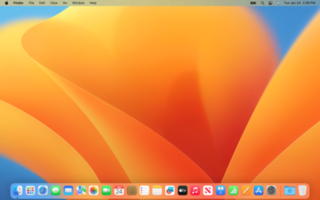
Irssi is an IRC client program for Linux, FreeBSD, macOS and Microsoft Windows. It was originally written by Timo Sirainen, and released under the terms of the GNU GPL-2.0-or-later in January 1999.

macOS is a Unix operating system developed and marketed by Apple Inc. since 2001. It is the primary operating system for Apple's Mac computers. Within the market of desktop and laptop computers, it is the second most widely used desktop OS, after Microsoft Windows and ahead of Linux.
Cocoa is Apple's native object-oriented application programming interface (API) for its desktop operating system macOS.

Winamp is a media player for Microsoft Windows originally developed by Justin Frankel and Dmitry Boldyrev by their company Nullsoft, which they later sold to AOL in 1999 for $80 million. It was then acquired by Radionomy in 2014. Since version 2 it has been sold as freemium and supports extensibility with plug-ins and skins, and features music visualization, playlist and a media library, supported by a large online community.

ChatZilla is an IRC client that is part of SeaMonkey. It was previously an extension for Mozilla-based browsers such as Firefox, introduced in 2000. It is cross-platform open source software which has been noted for its consistent appearance across platforms, CSS appearance customization and scripting.

The iPod is a discontinued series of portable media players and multi-purpose mobile devices designed and marketed by Apple Inc. The first version was released on October 23, 2001, about 8+1⁄2 months after the Macintosh version of iTunes was released. Apple sold an estimated 450 million iPod products as of 2022. Apple discontinued the iPod product line on May 10, 2022. At over 20 years, the iPod brand is the oldest to be discontinued by Apple.
Jeffrey L. Robbin is an executive and software engineer at Apple, Inc.. He developed the SoundJam music player software, which was acquired by Apple in 2000. There, he created iTunes, and was "closely involved" with the iPod's development. In 2011, Bloomberg reported that he was leading development of an Apple television set, a device rumored in Steve Jobs's autobiography. As of 2018, he led the Apple Music product and engineering teams.

Colloquy is an open-source IRC, SILC, ICB and XMPP client for Mac OS X. Colloquy uses its own core, known as Chat Core, although in the past it used Irssi as its IRC protocol engine. One of the primary goals behind Colloquy was to create an IRC, SILC and ICB client with Mac OS X visuals. Colloquy contains a user interface that follows Apple's Human interface guidelines in addition to containing support for traditional IRC command-line controls such as /nick and /join.
SoundJam MP is a discontinued MP3 player for classic Mac OS-compatible computers and Rio-compatible hardware synchronization manager that was released in July 1999 and was available until June 2001. Jeff Robbin and Bill Kincaid developed SoundJam MP with assistance from Dave Heller. Robbin and Kincaid chose Casady & Greene to publish SoundJam MP. Apple, Inc. purchased SoundJam MP in 2000 and further developed the code to create iTunes version 1.0. Casady and Greene ceased publication of SoundJam MP in June 2001 at the request of the developers.

The iTunes media platform was first released by Apple in 2001 as a simple music player for Mac computers. Over time, iTunes developed into a sophisticated multimedia content manager, hardware synchronization manager and e-commerce platform. iTunes was finally discontinued for new Mac computers in 2019, but is still available and supported for Macs running older operating systems and for Windows computers to ensure updated compatibility for syncing with new releases of iOS devices.
This is a list of iPod file managers. i.e. software that permits the transferring of media files content between an iPod and a computer or vice versa.
MacHack was a Macintosh software developers conference first held in 1986 in Ann Arbor, Michigan in partnership with the University of Michigan. The conference was organized and operated by Expotech, Inc. The final (18th) MacHack conference took place on June 19–21, 2003. In 2004 the conference was renamed ADHOC. 2005 was the last year of the ADHOC conference.

Apple TV is a digital media player and microconsole developed and marketed by Apple Inc. It is a small network appliance hardware that plays received media data such as video and audio to a television set or external display. Since its second generation model, it is an HDMI-compliant source device and can only be connected to an enhanced-definition or high-definition widescreen television through HDMI to function.

Tweetie was a client for the social networking service Twitter. There was a mobile version that ran on iPhone, iPod Touch, and iPad, and a desktop version ran on Mac OS X Leopard, Snow Leopard and Lion.
Apache Cordova is a mobile application development framework created by Nitobi. Adobe Systems purchased Nitobi in 2011, rebranded it as PhoneGap, and later released an open-source version of the software called Apache Cordova. Apache Cordova enables software programmers to build hybrid web applications for mobile devices using CSS3, HTML5, and JavaScript, instead of relying on platform-specific APIs like those in Android, iOS, or Windows Phone. It enables the wrapping up of CSS, HTML, and JavaScript code depending on the platform of the device. It extends the features of HTML and JavaScript to work with the device. The resulting applications are hybrid, meaning that they are neither truly native mobile application nor purely Web-based. They are not native because all layout rendering is done via Web views instead of the platform's native UI framework. They are not Web apps because they are packaged as apps for distribution and have access to native device APIs. Mixing native and hybrid code snippets has been possible since version 1.9.

Apple Books is an e-book reading and store application by Apple Inc. for its iOS, iPadOS and macOS operating systems and devices. It was announced, under the name iBooks, in conjunction with the iPad on January 27, 2010, and was released for the iPhone and iPod Touch in mid-2010, as part of the iOS 4 update. Initially, iBooks was not pre-loaded onto iOS devices, but users could install it free of charge from the iTunes App Store. With the release of iOS 8, it became an integrated app. On June 10, 2013, at the Apple Worldwide Developers Conference, Craig Federighi announced that iBooks would also be provided with OS X Mavericks in fall 2013.

iCloud is a cloud service developed by Apple Inc. Launched on October 12, 2011, iCloud enables users to store and sync data across devices, including Apple Mail, Apple Calendar, Apple Photos, Apple Notes, contacts, settings, backups, and files, to collaborate with other users, and track assets through Find My. It is built into iOS, iPadOS, watchOS, tvOS and macOS and may additionally be accessed through a limited web interface and Windows application.
The following outline of Apple Inc. is a topical guide to the products, history, retail stores, corporate acquisitions, and personnel under the purview of the American multinational corporation Apple Inc.

Apple Podcasts is an audio streaming service and media player application developed by Apple Inc. for playing podcasts. Apple began supporting podcasts with iTunes 4.9 released in June 2005 and launched its first standalone mobile app in 2012. The app was later pre-installed with iOS beginning October 2014. The Apple Podcasts directory features more than two million shows. Apple Podcasts is available on iOS, iPadOS, macOS, watchOS, tvOS, CarPlay, Microsoft Windows operating systems, and on Amazon Alexa devices.










